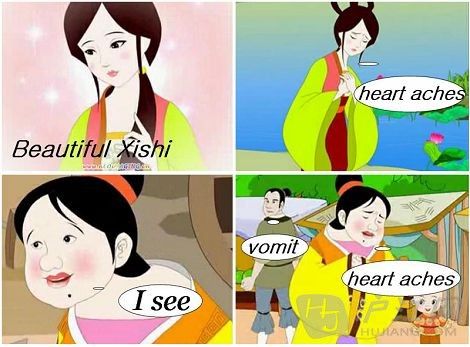少儿成语双语故事:东施效颦

扫描关注少儿英语微信
 少儿成语双语故事:东施效颦
少儿成语双语故事:东施效颦mere copycat东施效颦
In the Spring and Autumn Period (春秋时期,770-476 BC), there was a beauty in the State of Yue called Xishi (西施)。
传说春秋时期,越国有一美女,名唤西施。
She often suffered from pains in her chest, and so she would often walk around doubled over and with her brows knitted。
但是西施有心口疼的毛病,所以她经常手捂胸口,皱着眉头走着。
There was an ugly girl in the village called Dongshi who envied Xishi。
村子里还住着一位丑姑娘,叫做东施,她十分嫉妒西施。
Striving to emulate Xishi, she imitated her stoop, knitting her brows at the same time。
于是东施时常效仿西施,手捂胸口,紧皱眉头。
She thought that this made her elegant, but in fact, it only made her more ugly。
东施觉得她效仿西施就会变得很美丽,但是实际上,只会使她变得更难看而已。
Later, this idiom came to be used to indicate improper imitation that produces the reverse effect。
这个典故比喻不恰当的模仿,带来相反的效果。
【文化链接】
英文中“东施效颦”可以说成“mere copycat”,“mere”有“仅仅”的意思,而“copycat”则可以表示我们常说的“山寨”,也就是“模仿的产品”,所以合在一起就是“仅仅只是山寨而已”,也就是“东施效颦”所表达的含义啦~
比如说,大家都知道美国由好莱坞Hollywood,而印度有一个宝莱坞Bollywood,所以曾有人说“宝莱坞是不是东施效颦好莱坞呢?”,英文表达就是“Bollywood a mere copycat?”,但事实其实不是哈,宝莱坞已经越来越有自己的特色,也有很多广为人知的好电影了。
- 双语美文阅读:多想想美好的事情2015-04-14 10:07
- 双语揭秘:宠物赚钱比人多(图)2015-04-14 10:04
- 少儿成语双语故事:滥竽充数(图)2015-04-13 14:34
- 经典双语美文阅读:什么才重要2015-04-13 11:09
- 双语揭秘:运动才能保证孩子的健康2015-04-10 10:58

